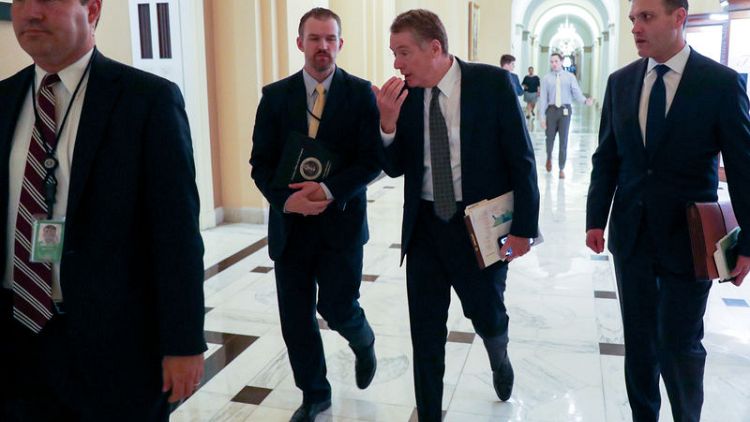By David Shepardson
WASHINGTON (Reuters) - The White House said on Friday that President Donald Trump is delaying a decision by up to six months on whether to impose tariffs on imported cars and parts to allow for more time for trade talks with the European Union and Japan.
It said, however, Trump agreed with findings that imported vehicles and parts can threaten U.S. national security.
Trump faced a Saturday deadline to make a decision on recommendations by the Commerce Department to protect the U.S. auto industry from imports on national security grounds.
Trump directed U.S. Trade Representative Robert Lighthizer to pursue negotiations and report back within 180 days and said if no deal is reached Trump will decide by then "whether and what further action needs to be taken."
In a proclamation released Friday, Trump said he agreed with a Commerce Department study that found some imported cars and trucks are "weakening our internal economy" and threaten to harm national security.
The auto tariffs face strong opposition in Congress, including from many prominent Republicans.
Reuters and other new outlets reported earlier this week that Trump was expected to delay the decision.
Automakers have strongly opposed the tariffs, saying they would hike prices and threaten thousands of U.S. jobs.
Trump's proclamation said "domestic conditions of competition must be improved by reducing imports" and said a strong U.S. auto sector is vital to U.S. military superiority.
The reported cited statistics that U.S.-owned companies' share of the U.S. automobile market has declined from 67 percent, or 10.5 million units produced and sold in the United States, in 1985 to 22 percent, 3.7 million units produced and sold in the United States, in 2017.
At the same time, the reports said imports nearly doubled, from 4.6 million units to 8.3 million units.
U.S. Commerce Secretary Wilbur Ross told Trump that "successful negotiations could allow American-owned automobile producers to achieve long-term economic viability and increase R&D spending to develop cutting-edge technologies that are critical to the defence industry."
Trump had threatened to impose tariffs of up to 25 percent on imported cars and trucks.
Automakers warned the tariffs cost hundreds of thousands of auto jobs, dramatically raise prices on vehicles and threaten industry spending on self-driving cars.
General Motors Co last year warned that import tariffs could cost jobs and lead to a “a smaller GM” while isolating U.S. businesses from the global market.
Toyota Motor Corp has said the tariffs “threaten U.S. manufacturing, jobs, exports, and economic prosperity.”
(Reporting by David Shepardson; Editing by Jeffrey Benkoe and Nick Zieminski)



